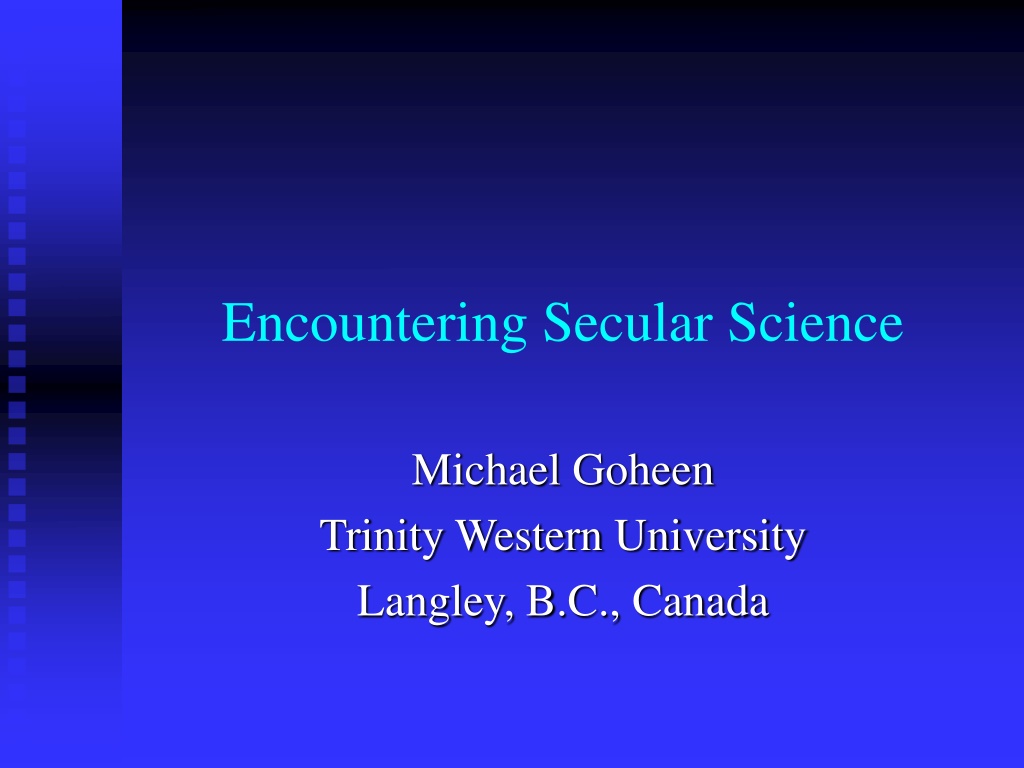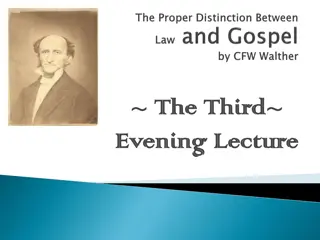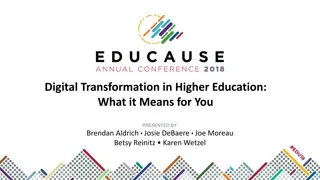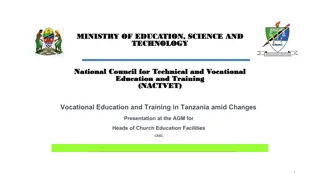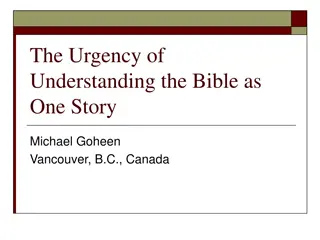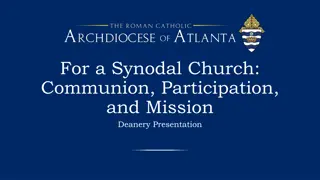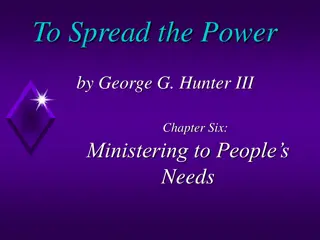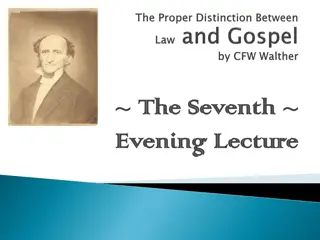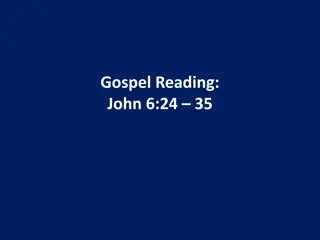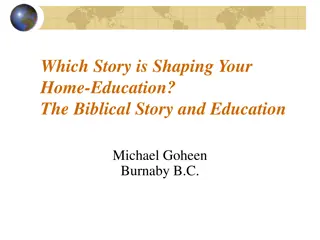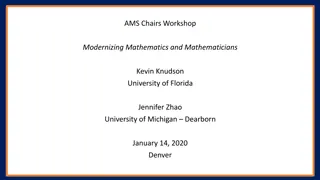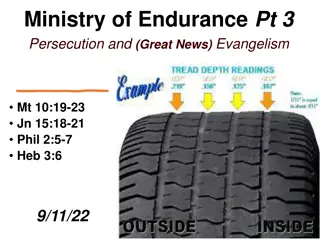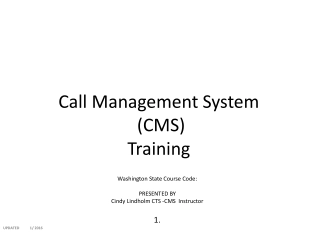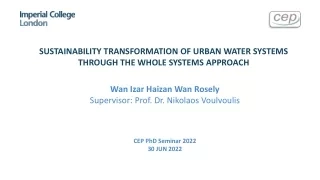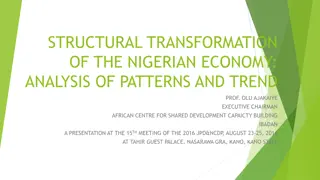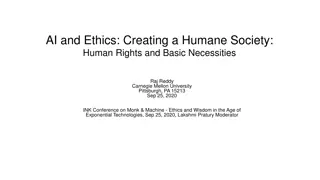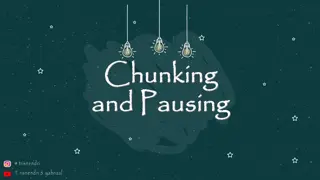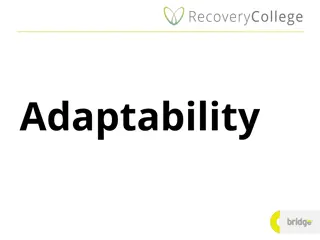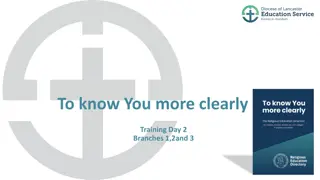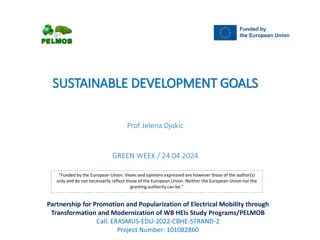Embracing the Gospel in Education: A Call to Transformation
Discover how the Gospel informs and shapes every aspect of education, from purpose to curriculum, in order to restore this crucial domain of human life. Explore the significance of ideas and the mission of the Church in engaging with secular sciences and diverse educational philosophies.
Download Presentation

Please find below an Image/Link to download the presentation.
The content on the website is provided AS IS for your information and personal use only. It may not be sold, licensed, or shared on other websites without obtaining consent from the author. Download presentation by click this link. If you encounter any issues during the download, it is possible that the publisher has removed the file from their server.
E N D
Presentation Transcript
Encountering Secular Science Michael Goheen Trinity Western University Langley, B.C., Canada
Starting with the Gospel Restorative: Good news! God is restoring creation Comprehensive: Good news! God is restoring all of human life in the context of all of the creation Story: Climax of long story of restoration Mission: Given to church to make known
The Spirit thrusts Gods people into worldwide mission He impels young and old, men and women, To go next door and far away Into science and art, media and marketplace, With the good news of God s grace. . . Following the apostles, the church is sent Sent with the gospel of the kingdom To tell the news that our world belongs to God. In a world estranged from God, where millions face confusing choices, this mission is central to our being The rule of Jesus Christ covers the whole world. To follow this Lord is to serve him everywhere, without fitting in, as lights in the darkness, as salt in a spoiling world.
Starting Observations Education good part of God s creation That has been corrupted by sin Announcement of the kingdom includes education within its scope Christian community sent to be good news in area of education Will involve an encounter with education shaped by other idolatrous beliefs
Gospel will shape every part of educational enterprise including: Purpose of education Pedagogy Curriculum Structures Leadership Evaluation Content of subject matter in various disciplines
Importance of Ideas So then, just as you received Christ Jesus as Lord, continue to live in him, rooted and built up in him, strengthened in the faith as you were taught, and overflowing with thankfulness. See to it that no one takes you captive through the hollow and deceptive philosophy, which depends on human tradition and the basic principles of this world rather than on Christ. - Colossian 2.6-8
Ideas have legs Ideas have legs in the sense that they are not the disembodied abstractions of some ivory-tower academic, but are real spiritual forces that go somewhere, that are on the march in somebody s army, and that have a widespread effect on our practical, everyday lives.
Slaves of ideas? The ideas of economists and political philosophers, both when they are right and when they are wrong, are more powerful than is commonly understood. Indeed, the world is ruled by little else. Practical men, who believe themselves to be quite exempt, from any intellectual influences, are usually the slaves of some defunct economist. Madmen in authority, who hear voices in the air, are distilling their frenzy from some academic scribbler of a few years back. I am sure that the power of vested interests is vastly exaggerated compared with the gradual encroachment of ideas. (John Maynard Keynes)
Power of ideas My point is that in such seemingly innocent-looking words and phrases a whole idolatrous perspective on the world, a whole distorted mind-set and humanistic thought-pattern is subliminally propagated in our civilization.
Power of secularized scholarship . . . science, secularised and isolated, has become a satanic power, an idol which dominates all of culture. (Herman Dooyeweerd)
Idolatrous spirit of secular science Ideas must be free from all religious commitment Gospel religious optional extra Dogma-free scholarship an illusion Deeply indebted to humanist religion Helpful to trace historical roots of secular science
Dualism of Augustine Spiritual realm Soul _____________________________________ Material realm Heaven Christian life Church Earth Body Society Cultural life
Two Storeys of Thomas Aquinas GRACE Spiritual realm Supernatural Soul Faith __________________________________________ Material realm NATURE Church Revelation Christian life Theology Natural Body Empirical reason Society Natural law Cultural life Science
From dualism to secularism . . . in connection with the history of his influence the fact cannot be overlooked that the Christian mediaeval synthesis presented by Thomas is one of extreme tension, and in the dynamic of historical development had effects which were to prove self-destructive: there was to be an unprecedented and all- embracing movement of secularization and emancipation at the lower level. (K ng)
Secularism in succeeding centuries While scholastic theologians granted a limited degree of autonomy to the realm of our natural life (and natural reason), the Renaissance humanists so greatly expanded the autonomy of nature that there was no longer any need for the realm of grace. If God and Christianity were already basically irrelevant to most of life, why not make their irrelevance complete? (Walsh and Middleton)
Methodological Reason Descartes Mathematical Method Newton Scientific Method Bacon Empirical Method Nature and nature s laws lay hid in night; God said Let Newton be! and all was light. -Alexander Pope
Triumph of humanist vision Conflict with the church
He sets the earth on its foundations; it can never be moved (Ps. 104:5). O sun, stand still... so the sun stood still (Josh. 10:12f.). The earth remains forever. The sun rises and the sun sets, and hurries back to where it rises (Eccl. 1:4f.).
People give ear to an upstart astrologer who strove to show that the earth revolves, not the heavens or the firmament, the sun and the moon. Whosoever wishes to appear clever must devise some new system which of all systems, of course, is the best. This fool wishes to reverse the entire science of astronomy; but Sacred Scripture tells us that Joshua commanded the sun to stand still, and not the earth. -Martin Luther
The Copernican theory undoubtedly contained a challenge for the Catholic theology. But instead of accepting the challenge and reflecting on faith in a new perspective, the Church opted for an easy conservatism, keeping the enemy at bay by means of its anathemas. This failure to accept the challenge of a new world picture was a great loss to the Church and to Christianity. -Max Wildiers
Triumph of humanist vision Conflict with the church
Triumph of humanist vision Success in Newtonian Paradigm of Physics Science unites Conversion of Europe Gospel divides Religious Wars
Historical results Creation separated from presence of God Natural laws built into creation Can be discerned by autonomous reason Controlled to harness laws for social uses Technology and rational organisation of society
Secular world devoid of Gods presence
Deistic world devoid of Gods presence
Descartes method Methodological Reason Individual knower Method Object to be known Subjective factors
Three uses of word law Word God speaks to give creation order Lawful regularity we experience in creation Attempt at scientific, analytical formulation of these regularities E. D. Fackerell
Fact-Value Dichotomy Truth Facts Public Know Truth Claims Opinions Values Private Believe
Neutral Reason? Subjective factors affecting knowledge: Social -Tradition -Community -Language -Culture -History -Faith Personal -Feelings -Imagination -Subconscious -Gender -Class -Race
Two Idolatrous Positions Rational Objectivism: Academic theory is religiously neutral (modernity) Radical Relativism: Knowledge of reality is product of our beliefs only (postmodenity)
Testing our times by the Spirits sure word But rebel cries sound through our world. Some, crushed by failure or hardened by pain, give up on life and hope and God; Others, shaken but still hoping for human triumph, work feverishly to realise their dreams. As believers in God we join this struggle of the spirits Testing our times by the Spirit s sure word
Testing our times Rational Objectivism: Academic theory is religiously neutral (modernity) Response Agree: Stable creation order all can know Disagree: Beliefs shape our theories Radical Relativism: Knowledge of reality is product of our beliefs only (postmodernity) Response Agree: Beliefs shape our theories Disagree Religious beliefs most important Constant order of creation that can be known
Gods Ruling Word The Bible shows us a personalistic world, not impersonal law. What we call scientific law is an approximate human description of just how faithfully and consistently God acts in ruling the world by speaking. There is not mathematical, physical, or theoretical cosmic machinery behind what we see and know, holding everything in place. Rather God rules and rules consistently - Vern Poythress
Three uses of word law Word God speaks to give creation order Lawful regularity we experience in creation Attempt at scientific, analytical formulation of these regularities E. D. Fackerell
A Biblical Example John s use of classical pagan thought
The time has come. The kingdom of God is near. Repent and believe the good news. (Mark 1:15) I must preach the good news of the kingdom of God to other towns also, because that is why I was sent. (Luke 4:43)
In the synoptic gospels the Kingdom of God is: Central image for the Jews Central image for Jesus Central image for Matthew, Mark, Luke
You are from below, I am from above; you are of this world, I am not of this world (John 8:23). No one has ever gone into heaven except the one who came from heaven--the Son of Man (John 3:13). The light shines in the darkness, and the darkness has not overcome it (John 1:5). No one has ever gone into heaven except the one who came from heaven--the Son of Man (John 3:13). That which is born of the flesh is flesh and that which is born of the Spirit is spirit (John 3:6).
In Johns gospel... He employs images popular in classical culture and philosophy Heaven/earth, life/death, light/darkness, flesh/spirit
Do we have a different gospel? Bultmann s answer: Yes - Synoptics Jewish categories Horizontal, in time Renewal of creation In kingdom of God -John Greek categories Vertical, in space Salvation of individuals In heaven
Do we have a different gospel? My answer: No John articulated the same gospel in fresh language in a new cultural context. The language reflected a pagan worldview yet was transformed and subverted by the gospel.
John 1:1,14 In the beginning was the logos... ...and the logos became sarx.
Encounter with pagan thought Insight: Order to world Idolatry: Order not spiritual principle that permeates universe but given by Jesus
Discernment What is insight into God s creation? What is idolatry that twists that insight?
Christian School Teacher? Deepen our understanding of the Western story and its idolatrous beliefs Need to tackle this as an educational community Need for spiritual weapons Roots into the gospel Prayer
Prayer In . . . our vocation to war against the spirit of apostasy . . . we cannot battle this spirit in our own power. The warfare to which I refer is one of faith, a struggle even with ourselves, in the power of the Holy Spirit, a struggle which finds its dynamic in a life of prayer. (Herman Dooyeweerd)
